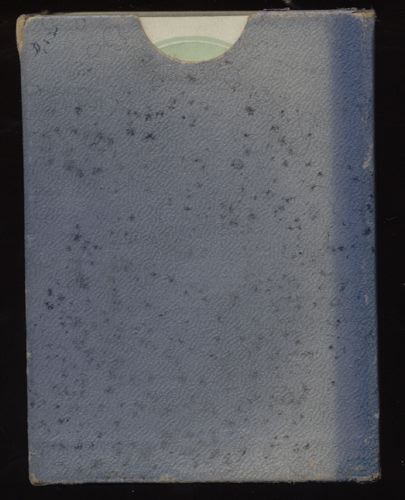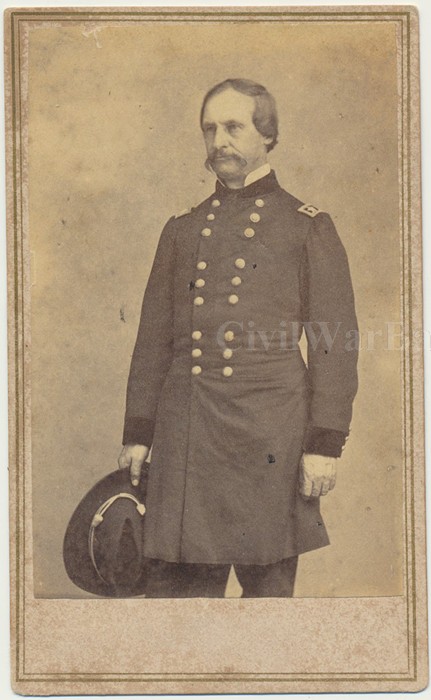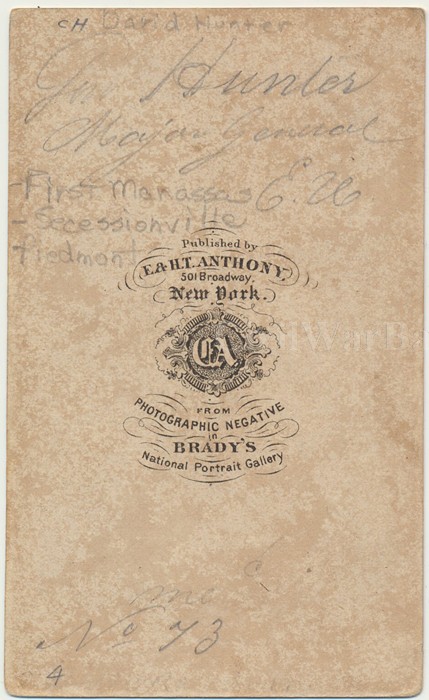MAJOR GENERAL DAVID HUNTER
Item #: CWB12989
Click on an image to enlarge
Hunter, David, major-general, was born in Washington, D.
C., July 21, 1802, was graduated at West Point in 1822, and
after becoming captain in the 1st dragoons in 1833, resigned
his commission in 1836, to go into business in Chicago. He
rejoined the army as paymaster with the rank of major in 1842,
and was chief paymaster of Gen. John E. Wool's command in the
Mexican war serving after that at New Orleans and at other
posts, including those on the frontier. He was assigned, in
Feb., 1861, to accompany President-elect Lincoln from his home
in Springfield, Ill to Washington, but at Buffalo his collar-
bone was dislocated by the pressure of the crowd that gathered
to see Lincoln, and he did not arrive at Washington until May
14. He was then appointed colonel of the 6th U. S. cavalry,
and three days later was given a commission as brigadier-
general of volunteers. He commanded the main column of
McDowell's army in the Manassas campaign, was severely wounded
at Bull Run, July 21, 1861, and on Aug. 1, 1861, was made
major-general of volunteers, serving under Gen. Fremont in
Missouri, and on Nov. 2, succeeding him in the command of the
western department. He commanded the Department of Kansas
from Nov., 1861, until March, 1862, and by his prompt
reinforcement of Grant at Fort Donelson, at the solicitation
of Gen. Halleck, made possible the victory of Feb. 16, 1861.
In March, 1862, Gen. Hunter was transferred to the Department
of the South, with headquarters at Port Royal, S. C., and his
first effective movement was the capture of Fort Pulaski April
11, 1862. Finding there a large number of able-bodied, idle
negroes, willing to enlist in the United States service, Gen.
Hunter on April 12, issued an order declaring that slavery and
martial law were incompatible, further declaring free all
slaves in Fort Pulaski and on Cockspur island, Ga., and on May
9, he extended the declaration to slaves in Georgia, Florida
and South Carolina. On May 19, President Lincoln issued a
proclamation which declared Gen. Hunter's order entirely void
and given without authority. On June 16, 1862, an expedition
against Charleston by way of James island resulted in the
disastrous battle of Secessionville- an attack which,
according to Gen. Hunter's report, was made contrary to his
orders. Gen. Hunter organized the 1st S. C. volunteers, a
regiment composed of refugee slaves which was the first of the
kind to be mustered into the U. S. volunteer service. In
September, he was ordered to Washington and was made president
of a court of inquiry to investigate the causes for the
surrender of Harper's Ferry and other matters, and he
subsequently served as president of the court-martial
instituted by Gen. Pope to try Gen. Fitz-John Porter for
disobedience to orders. He was placed in command of the
Department of West Virginia in May, 1864, defeated a
Confederate force at Piedmont on June 5, moved on Lynchburg on
the 8th by way of Lexington, where he burned the place, and on
the 16th of June, invested Lynchburg, falling back then by way
of the Kanawha river, thus bringing his army to the Ohio river
and leaving the valley for several weeks open to the mercy of
Early. Gen. Hunter was then on leave of absence until Feb. 1,
1865, after which he served on courts-martial, being president
of the commission that tried the persons who were charged with
conspiring for the assassination of President Lincoln. He was
brevetted major-general U. S. A., March 13, 1865, and was
mustered out of the volunteer service in Jan., 1866. He was
retired the following July, and died in Washington, D. C.,
Feb. 2, 1886.Shipping Weight:
0.6 lb
Item # CWB12989
$175.00 USD



